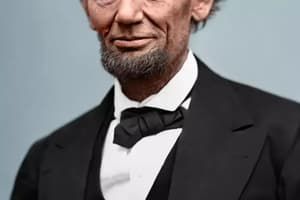Podcast
Questions and Answers
What was one of the main messages in Lincoln's 1st Inaugural Address?
What was one of the main messages in Lincoln's 1st Inaugural Address?
- He declared war against the Confederacy.
- He encouraged immediate secession by the Southern states.
- He reassured the South regarding their fears of his presidency. (correct)
- He proposed the end of the Fugitive Slave Law.
What event marked the first confrontation of the Civil War?
What event marked the first confrontation of the Civil War?
- The 1st Battle of Bull Run.
- The signing of the Corwin Amendment.
- The surrender of Fort Sumter. (correct)
- Lincoln's 1st Inaugural Address.
How did the Southern states view Lincoln's actions regarding secession?
How did the Southern states view Lincoln's actions regarding secession?
- As a violation of their rights that could lead to anarchy. (correct)
- As a necessary defense of democracy.
- As an invitation for negotiation and compromise.
- As a manageable threat to states' rights.
What advantage did the North have over the South at the onset of the Civil War?
What advantage did the North have over the South at the onset of the Civil War?
What was the outcome of the 1st Battle of Bull Run?
What was the outcome of the 1st Battle of Bull Run?
Flashcards
Lincoln's First Inaugural Address
Lincoln's First Inaugural Address
Lincoln's first speech as president, aimed at calming the Southern states and preventing secession. He assured them that he wouldn't interfere with slavery in existing states and offered compromise through the Corwin Amendment and the Fugitive Slave Law. However, he clearly stated that secession would not be tolerated.
Confrontation at Fort Sumter
Confrontation at Fort Sumter
The pivotal moment where the Confederate forces fired upon the Union fort, marking the start of the American Civil War. Although the fort surrendered without casualties, the event ignited the secession of four more states, Virginia, Tennessee, Arkansas, and North Carolina, joining the Confederacy.
Southern Perspective on the War
Southern Perspective on the War
The belief held by Southerners that Lincoln's actions were a threat to democracy, leading to anarchy, prompting them to secede and defend their rights. They hoped for foreign assistance and anticipated weariness in the North.
Northern Perspective on the War
Northern Perspective on the War
Signup and view all the flashcards
First Battle of Bull Run
First Battle of Bull Run
Signup and view all the flashcards
Study Notes
Lincoln's Inaugural Address & Secession
- Lincoln's first inaugural address was calm and reassuring to the South, emphasizing that secession would not be tolerated.
- He appealed to the states to not be enemies, but friends.
- He stated that states needed approval from other states before secession.
Fort Sumter & War Beginning
- Fort Sumter supplies were refused by South Carolina.
- Lincoln tried again, but the South fired the first shots, marking the beginning of the war.
- Fort Sumter was surrendered to the Confederacy without any casualties.
Secession of Southern States
- Lincoln called for volunteer troops.
- As a result, four more states (Virginia, Tennessee, Arkansas, North Carolina) seceded from the Union.
War's Onset and Advantages
- The South viewed secession as a violation of rights, and Lincoln's actions as a threat to democracy.
- Lincoln aimed to preserve the Union.
- South had advantages like defensive war, military leadership, and tactics.
- The South hoped for foreign aid and Northern weariness.
- North had advantages like superior population, larger economy, more states, access to resources, industry, transportation, and a stronger navy and banks.
First Battle of Bull Run
- The Confederacy successfully defended the Confederate capital, Richmond, VA.
- The Union army retreated and panicked, driven back to Washington.
- This battle showed that the war wasn't as easy as expected. Confederates felt confident but didn't push the advantage.
Studying That Suits You
Use AI to generate personalized quizzes and flashcards to suit your learning preferences.
Description
Explore the key themes in Lincoln's inaugural address and the events leading to the Civil War. This quiz covers the secession of Southern states, the beginning of hostilities at Fort Sumter, and the contrasting views on democracy and rights in this pivotal moment of American history.




